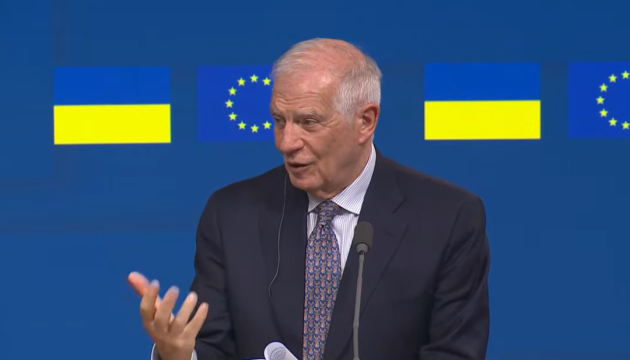
EU’s total military aid to Ukraine up to EUR 33B - Borrell
After EU foreign ministers adopted a decision to create an aid fund for Ukraine within the framework of the European Peace Facility, the total amount of military aid from the EU and its member states increased to EUR 33 billion, and member states pledged to allocate another EUR 20 billion before year-end for military support to Ukraine on a bilateral basis.
EU High Representative Josep Borrell stated this today in Brussels during a press conference following the EU-Ukraine Association Council, reports an Ukrinform correspondent.
An additional EUR 5 billion worth of assistance would make EU’s military aid to Ukraine “more predictable”, Borrell said.
Speaking of member states’ intentions to allocate another EUR 20 billion in military aid to Ukraine on a bilateral basis, the top diplomat noted that the European Peace Facility serves as a catalyst for bilateral agreements between member states and Ukraine.
He noted that these resources were mobilized because Ukraine's victory in the confrontation against the aggressor is important for European security. If Putin succeeds in winning in Ukraine, if Ukraine is offered to raise the white flag and surrender, then a puppet regime will be established in Kyiv, the Ukrainian nation will be destroyed, and the Russian army will advance to the borders of the European Union.
The High Representative assured that the EU “won't stop” at this.
He recalled that in his victory speech this week in the so-called "elections", Vladimir Putin threatened NATO with a potential World War 3. According to Borrell, this sends a clear signal that Putin has already targeted the entire West. In these circumstances, it is obvious that Putin will continue his military operation against Ukraine, and that is why the EU must develop options to respond to the further spread of the existing threat.
As reported, the Ukraine-EU Association Council was held in Brussels today with the participation of the Prime Minister of Ukraine, Denys Shmyhal, and key members of his Cabinet. The participants considered a wide range of issues in bilateral relations, including the provision of financial support to Ukraine required amid the ongoing war, the development of economic cooperation, as well as Ukraine’s progress on reforms on the path to EU membership.
